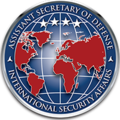| Name | Tenure | SecDef(s) served under | President(s) served under |
|---|
| Assistant to the Secretary of Defense (International Security Affairs) |
| John H. Ohly | March 27, 1949 – December 1, 1949 | Louis A. Johnson | Harry S. Truman |
| Maj. Gen. James H. Burns (USA) | December 6, 1949 – August 27, 1951 | Louis A. Johnson
George Marshall | Harry S. Truman |
| Frank C. Nash | August 28, 1951 – February 10, 1953 | George Marshall
Robert A. Lovett
Charles E. Wilson | Harry S. Truman
Dwight D. Eisenhower |
| Assistant Secretary of Defense (International Security Affairs) |
| Frank C. Nash | February 11, 1953 – February 28, 1954 | Charles E. Wilson | Dwight D. Eisenhower |
| H. Struve Hensel | March 5, 1954 – June 30, 1955 |
| Gordon Gray | July 14, 1955 – February 27, 1957 |
| Mansfield D. Sprague | February 28, 1957 – October 3, 1958 | Charles E. Wilson
Neil H. McElroy |
| John N. Irwin II | October 4, 1958 – January 20, 1961 | Neil H. McElroy
Thomas S. Gates Jr. |
| Paul Nitze | January 29, 1961 – November 29, 1963 | Robert McNamara | John F. Kennedy
Lyndon B. Johnson |
| William Bundy | November 29, 1963 – March 14, 1964 | Lyndon B. Johnson |
| John T. McNaughton | July 1, 1964 – July 19, 1967 |
| Paul Warnke | August 1, 1967 – February 15, 1969 | Robert McNamara
Clark Clifford
Melvin Laird | Lyndon B. Johnson
Richard Nixon |
| G. Warren Nutter | March 4, 1969 – January 30, 1973 | Melvin Laird
Elliot Richardson | Richard Nixon |
| Lawrence Eagleburger (Acting) | January 31, 1973 – May 10, 1973 | Elliot Richardson |
| Robert C. Hill | May 11, 1973 – January 5, 1974 | Elliot Richardson
James R. Schlesinger |
| Vice Adm. Raymond E. Peet (Acting) | January 6, 1974 – April 1, 1974 | James R. Schlesinger |
| Amos Jordan (Acting) | April 2, 1974 – June 4, 1974 |
| Robert Ellsworth | June 5, 1974 – December 22, 1975 | James R. Schlesinger
Donald Rumsfeld | Richard Nixon
Gerald Ford |
| Amos Jordan (Acting) | December 23, 1975 – May 5, 1976 | Donald Rumsfeld | Gerald Ford |
| Eugene V. McAuliffe | May 6, 1976 – April 1, 1977 | Donald Rumsfeld
Harold Brown | Gerald Ford
Jimmy Carter |
| David E. McGiffert | April 4, 1977 – January 20, 1981 | Harold Brown | Jimmy Carter |
| Bing West | April 4, 1981 – April 1, 1983 | Caspar Weinberger | Ronald Reagan |
| Richard Armitage | April 2, 1983 – June 5, 1983 (Acting)
June 5, 1983 – June 5, 1989 | Caspar Weinberger
Frank Carlucci
William Howard Taft IV (Acting)
Dick Cheney | Ronald Reagan
George H. W. Bush |
| Harry Rowen | June 26, 1989 – July 31, 1991 | Dick Cheney | George H. W. Bush |
| James R. Lilley | December 12, 1991 – January 20, 1993 |
| Assistant Secretary of Defense (Regional Security Affairs) |
| Charles W. Freeman Jr. | July 6, 1993 – April 11, 1994 | Les Aspin
William Perry | Bill Clinton |
| Assistant Secretary of Defense (International Security Affairs) |
| Charles W. Freeman Jr. | April 11, 1994 – September 14, 1994 | William Perry | Bill Clinton |
| Joseph Nye | September 15, 1994 – December 16, 1995 |
| Franklin D. Kramer | March 29, 1996 – February 16, 2001 | William Perry
William Cohen
Donald Rumsfeld | Bill Clinton
George W. Bush |
| Peter Rodman [4] | July 16, 2001 – March 2, 2007 | Donald Rumsfeld
Robert Gates | George W. Bush |
| Mary Beth Long [5] | March 3, 2007 – December 21, 2007 (Acting)
December 21, 2007 – January 20, 2009 | Robert Gates |
| Michael W. Coulter (Acting) | January 20, 2009 – April 3, 2009 | Barack Obama |
| Alexander Vershbow | April 3, 2009 – February 10, 2012 |
| Derek Chollet [6] | June 1, 2012 – January 15, 2015 | Chuck Hagel |
| Elissa Slotkin (Acting) | January 15, 2015 – January 20, 2017 | Chuck Hagel Ash Carter |
| Kenneth B. Handelman (Acting) | January 20, 2017 – June 7, 2017 [7] | Jim Mattis | Donald Trump |
| Robert Karem | June 7, 2017 – October 31, 2018 [8] |
| Kathryn L. Wheelbarger (Acting) | October 31, 2018 – July 4, 2020 | Jim Mattis
Mark Esper |
| Michael C. Ryan (Acting) | July 5, 2020 – August 31, 2020 | Mark Esper |
| Michael Cutrone (Acting) | September 1, 2020 – January 20, 2021 |
| Laura Cooper (Acting) | January 20, 2021 – February 9, 2021 | Lloyd Austin | Joe Biden |
| Mara Karlin (Acting) [9] | February 9, 2021 – August 17, 2021 |
| Laura Cooper (Acting) | August 17, 2021 – December 17, 2021 |
| Ilan Goldenberg (Acting) | December 17, 2021 – February 22, 2022 |
| Celeste Wallander | February 22, 2022 – January 20, 2025 |
| Katherine Thompson (Performing The Duties Of) | January 20, 2025 - July 8, 2025 | Pete Hegseth | Donald Trump |
| Daniel Zimmerman | July 8, 2025 - Incumbent |


